

On an almost barren planet populated with small number of human settlements Dan Sylveste leads a successful archeological in discovering the long lost Amarantin civilization. This is done amidst social unrest, resulting in his imprisonment. Seemingly unconnected, an assassin named Ana Khouri hunts down those willing to test their luck and mettle against her. In interstellar space one third of a Triumvir - Ilya Volyova, is hard pressed to keep the melding plague from spreading more pervasively throughout the Lighthugger. Onboard this ship is a cache of forty ancient weapons, all which are sentient, have their part to play. Ana Khouri employer known only as Mademoiselle informs Ana that her long lost husband may be united if she is willing to assassinate Dan Sylveste on planet Resurgam. She agrees and as events unfold Ilya Volyova and her crew mates onboard the Nostalgia For Infinity land on Ana Khouri's current planet Yellowstone and are seeking new members. Underscoring this marvellous debut novel is the sentient alien life which has/had reached space faring capabilities always met an untimely end. Does this validate Fermi's paradox: "If aliens are out there, then why haven't we met them?" This novel deserves to be better known. Revelation Space is the finest debut science fiction novel I ever read.

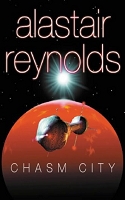
Chasm City is the second novel set in the Revelation Space series and it does justice to its author. Tanner Mirabel is a mercenary hell bent on revenge. His tracking of a man named Reivich from Sky's Edge to the melting cesspool of Chasm City is his sole focus. Tanner also has inner demons to deal with. His body is infected with a virus which troubles Tanner in his sleep. It induces feelings of incredible intensity about the psychopath/founder of Sky's World; a certain Sky Haussmann, whose history itself is slowly revealed as Tanner's episodes of a seeming psychotic break escalate. Chasm City is a place of marvels, horrors and bizarre characters who eke out a living among its dangerous streets. Through this maze of meandering alleys, back-street markets and potential life ending danger Tanner relentlessly hunts down his enemy. From this novels first major event initializing with space-elevator sabotage to cold storage, mystery drugs, high-tech weaponry and the upper classes observing and competing in bungee jumping into poisonous clouds I was hooked. The only event in this novel which had me cringing was the life and death chase scene involving cable cars strung across the interior canopy of the bio dome, it is worthy of a Hollywood hack. Comes close to matching Revelation Space and that's high praise. Damn fine follow up.

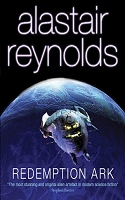
Redemption Ark is the third book of the Revelation Space series and begins to answer some of the plot developments that Reynolds has left tantalizingly from the first two books. It deals more with events uncovered in Revelation Space concerning the Lighthugger Nostalgia For Infinity with its now depleted crew and Dan Sylveste still living on Resurgam, who holds knowledge that will have far reaching consequences for all Humanity. Mechanically enhanced human Conjoiners are fighting a space war around Yellowstone, the world of Chasm City and forewarned independently of what Sylveste knows by a secret project long abandoned begin the duty of retrieving the weapons cache which they hid and was discovered by the Nostalgia For Infinity. Ilya Volyova now running the affairs of Resurgam though the locals are unaware of who she truly is learns of the unavoidable fate the planet's inhabitants and sets in motion the mass evacuation of all and sundry. Ana Khouri still has a mission of her own. This is another space operatic blast wailing on all channels with gritty determination, self realization, personal and political whims, jousts for power and ultimately the terrible acceptance that fate is about to deal Humankind a hellish hammerblow. Alastair Reynolds serves up yet another helping of space opera sublimity.

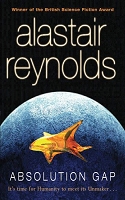
I was looking forward to Absolution Gap with great anticipation. How will it all end? Will Humanity in some way some shape or form be able to stop the Inhibitors from purging the Milky Way Galaxy from yet another space-faring species? These questions are skirted over and never fully addressed in Absolution Gap. It centres on Hela, barren moon of the gas-giant Haldora. On this backwater mobile cathedrals lumber forever around Hela staring ever attentively at the gas giant. This religion and its practitioners are seen for what they truly represent by a young girl (daughter of Ana Khouri, though she is unaware of her true lineage). This religion apotheosis is believed by their leader to be at hand and this is a large crux of the novel. The Nostalgia For Infinity now in this solar system after abandoning Ararat years previously to save Khouri's daughter Aura is joined by many other Lighthuggers who seek favour with the religions patriarch. This novel lacks the sheer thrill and excitement of previous works and settles on a wait-and-see-what-happens scenario. I found it at time paced infuriating slow and stuttering to an inconclusive finale. I believe this is deliberate and sometime in the future we will see books continuing the Revelation Space series. A disappointing conclusion (if it is truly the case) of a marvellous space opera sequence. Please! Mr. Reynolds: I want more.

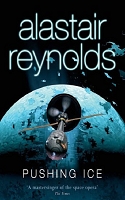
Another novel containing the standard offerings of yet more BDO's (Big Dumb Objects). One of Saturn's moons starts to act in a very non Newtonian manner and leaves orbit on a projected course to Spica. This star is some two hundred and sixty light years distant so time is of the essence. This moon, Janus, naturally sparks interest. The crew of the commercial mining spacecraft Rockhopper IV are offered monetary incentives by the conglomerate which owns the vessel to visit Janus and detail as much as possible before the moon leaves the solar system. Captained by the alpha female Bella Lind, the crew are informed that this solar improvisation is to be a short lived odyssey. She is to proven so wrong. During the trip to Janus, a horrific accident threatens to end the mission before it truly begins. The question of whether their is enough fuel to return home is brought up by Bella's closet friend Svietlana Barseghian. A mutiny is narrowly avoided but the crew will never return home. Janus is to be their new home, but for how long? This novel details the trials and deadly implications it means for humans to adapt to life on a near barren moon. The colony which springs up on Janus; named Crabtree, in memory of a murdered crewmate is managed in a very Draconian manner by the new head of this fledgling colony -- Svietlana. This book is about the machinations of those who remained faithful to Bella and those who sided with Svietlana. The faction which sided with Svietlana harbour resentments towards those who managed to subvert their majority decision to have returned home when they had the chance. Lives are to be lost, some taken by the moon itself, others by those with murderous intent. The relationship between the two alpha females is the crux of this novel. I found it to be a little too cold and regimented in its presentation. When Janus arrives at the Spican structure, we are then introduced to a menagerie of aliens, which raise the political stakes between both factions. It is a fractious society as one alien insightfully point outs, but it works. Overall, this is a novel with all the hallmarks of an Alastair Reynolds creation. Is that a good thing? To a very large extent is most certainly is.


Within this volume we are presented with two novellas set in the Revelation Space universe.
Diamond Dogs
Diamond Dogs is a fairly straight forward story involving a motley crew of mercenaries who have been attracted to the ice planet desert wastes of Golgotha. On this planet their stands a tower, worryingly named the Blood Spire. The tens of dismembered bodies surrounding it base testify that it has been christened most succinctly. Richard Swift lured by the challenge the tower represents accepts his friends offer to explore its inner workings. Blood Spire contains nothing but empty rooms with door frames inlaid with graphic markings which constitute mathematical puzzles. They start out easy but progressively the toughness of the puzzles curve rapidly upward. Answer incorrectly and Blood Spire exacts a bloody toll. The characters bar a certain Dr. Trintignant are none too memorable but the narrative is flawless and the enigmatic structure though unoriginal leaves you wondering whether the crew were dealing with an artificial intelligence or a very technologically advanced rat maze. This novella is an afternoon's worth of distraction; it is only a mildly interesting read which leaves a bizarre ending.

Turquoise Days
Set on the Pattern Juggler world of Turquoise we are introduced to a isolationist society which studies the aquatic organisms. Naqi Opik, who lost her sister during an unsanctioned swim in and amongst the Pattern Jugglers has many ambivalent feelings towards the imminent arrival of the soon to be arrived newcomers. That unfortunate night coincided with the news that a lighthugger crew, the first ship to make contact with the natives of Turquoise in seven decades was seen in the night sky. The two events have never been lost from Naqi's thoughts. Turquoise Days is a deeper story. It resonates with a melancholic frequency and is told via first and third narrative. The newcomers are treated in a vert standoffish manner but it isn't until the final thirty pages that their true motives are exposed. I felt Reynolds dawdled a little too long in getting to the crux of the story which gave the final pages an accelerated necessity that the build up did not in any way hint at. Overall it is a decent story but the final paragraph left me feeling a little cold.

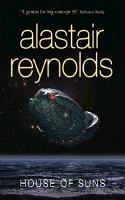
Another space opera is what is on offer here for you to peruse. What can I say that would allow you to realise that when it comes to my diet of science fiction I need generous helpings of the big, the bold, the imaginative, the magnificent, epoch tuning, galaxy spanning sensawunda? Oh yes ... it needs to be well done! Alastair Reynolds knows how to season all his novels' with all the above ingredients, but how does House Of Suns stand up? Very well in this reviewer's opinion. But I am getting ahead of myself, let me give a brief synopsis and review: that's why you're reading this after all.
Over six million into the future humankind (as is to be expected) travels throughout the Milky Way. We've done well to get this far and not annihilate ourselves into oblivion. Civilizations have popped up with frequency across the galaxy and into one minor but very well respected and ancient line of humans the peaceful lives they live and have lived for thirty two circuits of the galaxy is about to come to a fiery end. The Gentian Line - a society of near identical clones of Abigail Gentian - are targeted for extinction from the history books. After arriving late for a general get together on a prearranged planet our two main characters, a female named Purslane and a male named Campion, receive a very urgent warning not to enter the system. The planet has been destroyed and very few members of the line have escaped. Genocide on a truly planetary scale has taken place. This is of course only the beginning of what is to follow. As plots go this novel is generously loaded with so many questions that tantalise. Why the destruction? Why was it committed now? Who built the weapons to destroy the Gentian Line? How long was atrocity in the planning? All these questions are asked and examined as the storyline progresses but the author very deftly introduces a lot of developments that throw uncertainty into the mix. Part of the reason for our protagonists fortunate tardiness was the discovery of a robot named Hesperus. He was the captive of an unscrupulous businessman whose memory circuits have been scrambled but who knows that the knowledge that he is unable to bring to immediacy will be vital to the Gentian Line and humanity in general. His serendipitous discovery and release by our couple at the beginning of the novel is slightly contrived but without him this novel would not have worked. As the novel progresses one thing is certain, inside information, some trinket of knowledge that Campion discovered but which the Line cannot fathom to guess at, and the emergence of a secret Line tied into a very deep and dark secret ties all these invisible strands together. I found that themes such as the weight of history, forgiveness & revenge, betrayal, romance, the rise of the machines, are all wonderfully explored within this near perfect space opera.

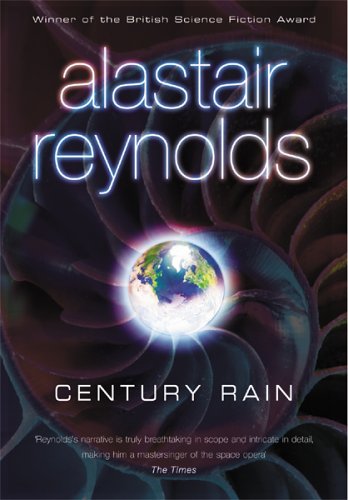
Paris is a city that holds nothing but promise, heartache, excitement, danger, and a possible end to a promising career for one Verity Auger. For Verity Auger is a bull-headed archaeologist carefully scouring a onetime capital city in the twenty-third century for records, any records, which will give a glimpse on the uninhabited planet as to life before the Nanocaust. Technological tampering has brought the planet to ruin. Nano technology and human hubris is to blame for the current state of affairs and it is this woman's fate to be brought up for charges of misconduct during an ill fated trip to Paris, currently a demarcation line of a newly brought about ice age. Her life is about to become a lot more complicated.
However, as is to be expected, she is to be given an opportunity to save her career if she is willing to play the role of an agent who just needs to pick up a few items. Sounds simple, but it isn't. Fed very little information, our mother of two divorcee is none too gently thrust headlong into a digital quagmire of solar politics, time travel, espionage, data retrieval, and bio-engineered assassin children; and this isn't the big plot twist or lure that will draw in a reader. What will draw you in is the fact that the majority of the novel will take place on earth in nineteen fifty nine, only this earth is situated in another part of the galaxy, and that its timeline has diverged from our own just before WWII. Codenamed E2, this sister planet's technology and all its divergent uses does not exist. The who, what, where, when and why as to why a snapshot of the earth is encased in a self-contained dome referred to as an ALS, is slowly teased to realization as the novel progresses. It is in this alternate Paris that Verity just has to collect a tin containing some paper documents but, a middle-aged detective named Floyd with a nose for trouble homes in our tough-as-nails protagonist. Knowing her cover story is fake and investigating the death of a young woman to whom Verity claims to be her sister, these two unlikely people are to become tangled in the plans of rogue elements who have dark designs on the pristine earth.
The background to this plot and its two divergent timelines is handled with aplomb. The characterisations are more than competent, the pace of events is pitch-perfect, the twists are like bolts of lightning from a clear blue sky, but something is lacking - it happens to be the interaction between Verity and Floyd. Their roles and bonds with their respective friends and relatives is more tangible than the love which blossoms between them. The narrative that spews back and forth is either very cagey and laced with insightful witticisms or is a subdued sweet agony of pent up emotions slowly dripping from one to the other as the stakes, body count, and proximity to fatal situations draws them closer and more dependent on the other - this was the novel's only failing. As a science fiction fan I can overlook this but when the romanticism of a space opera is overshadowed by a murder mystery theme it needs to be backed up by a more believable confluence of events. To me it seemed as if the author just created scenarios which directed the flow of events to tie up loose ends which would have left too many questions unanswered had he not.
The first third of this novel is written very well with no discernible flaws. The middle third tends to ebb and flow in quality with its over reliance on the budding amorous feelings of Verity and Floyd. The final third is a roller coaster ride which will keep you guessing (for the most part). Having finished this novel I find myself remembering it more for what it delivered than where its faults lie.

| Authors | Awards | Blogs |
| Fanzines | Index | Magazines |
| Publishers | Retailers | Reviews |